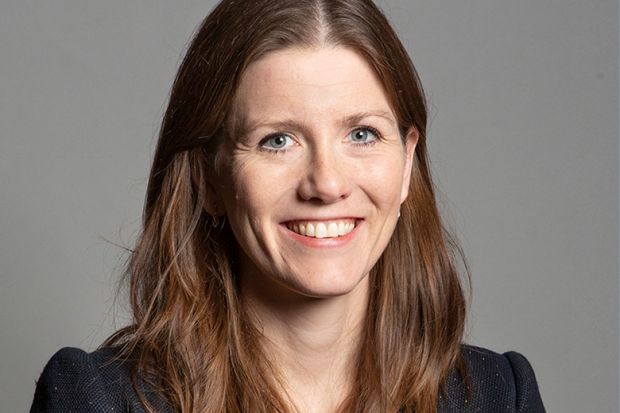Science secretary Michelle Donelan has sparked a free speech row after urging UK Research and Innovation (UKRI) to disband an equality advisory body over “unacceptable” social media posts by its members on the Israel-Gaza conflict.
In a letter to UKRI’s chief executive, Dame Ottoline Leyser, published on 28 October, Ms Donelan says she wants to “express, in the most serious terms, my disgust and outrage at Research England’s appointment of individuals to an advisory group on equality, diversity and inclusion who, since the 7 October attack” by Hamas “have been sharing some extremist views on social media”.
The membership of Research England’s advisory group, which was designed to provide “strategic advice on the prioritisation of key EDI issues in building research capacity and opportunity as well as delivering research that is more inclusive and representative of the population”, was announced on 26 October.
Ms Donelan says she is “outraged” that one of the chosen members – Kate Sang, professor of gender and employment studies at Heriot-Watt University – had described, in a tweet, the government’s plan to crack down on Hamas support in the UK as “disturbing”.
The tweet was referencing a Guardian article on 8 October reporting how home secretary Suella Braverman had vowed to use the “full force of the law” against displays of support for Hamas after Palestinian flags had been flown from cars the day after the atrocity. The attack by Hamas killed about 1,400 Israelis and more than 200 were taken hostage – an episode that Ms Donelan calls an “unspeakable act of violence and terror”.
The science secretary also condemns the “amplification” of a tweet by the advisory body’s chair, Kamna Patel, a development studies academic at UCL, which “condemns violence on both sides but makes reference to Israel’s ‘genocide and apartheid’”.
“I have always been clear – academic freedom and free speech within the law are sacrosanct,” continues Ms Donelan. “But public bodies, or those representing them, cannot be seen to take political positions let alone promote extremist ideologies,” she says, adding that the “political impartiality of our scientific funding system is vital”.
Claiming the Nolan principles of public life had been breached, Ms Donelan calls on Dame Ottoline to take “swift action”, saying her “strong preference would be that you immediately close this group and undertake an urgent investigation into what happened”.
In response, UKRI tweeted a comment from Dame Ottoline stating: “We are deeply concerned to have discovered these comments. We are conducting an immediate investigation.”
However, both Ms Donelan’s letter and the UKRI response have been strongly criticised online. The minister’s intervention was described on Twitter by one academic as “vile and repellent censorship” and by another as an “abhorrent abuse of power”. “Freedom of speech for academics, except for the speech you disagree with….isn’t freedom of speech at all,” said another commenter.
An open letter to UKRI signed by more than 1,800 academics, researchers and university staff has also criticised Ms Donelan's intervention, with signatories stating they are "deeply concerned about the current wave of repression and attempts at censorship led by the government against lawful expressions of solidarity with Palestinians and criticisms of the Israeli military’s heavy bombardment of the Gaza Strip since 7 October."
The minister's letter is criticised for misrepresenting the views of Professor Sang, stating "we categorically refute the suggestion that expressions of support for Palestinian civilians and their right to engage in organised political resistance can be equated with support for Hamas".
It urges UKRI to resist any call to disband the advisory group, stating "this intervention marks an attempt to create a climate of fear to deter academics from expressing opposition to grave human rights violations by Israel. This undermines academic freedom and the independence of UKRI."
Dame Ottoline’s response was also condemned by scholars on X, formerly Twitter, with one academic stating that “UKRI needs to push back against this type of intimidation and limitation on free speech as well as academic freedom”.
A UK professor wondered why Dame Ottoline had not mentioned a “minister overstepping her powers to bully academics into silence”, while another called it an “utterly shameful response”.
“The government should stop snooping on social media and focus on the UK’s problems,” said another UK scholar.
The letter follows Ms Donelan’s comments at the Conservative Party conference, where she vowed to “kick woke ideology out of science” after claiming that scientists were being “told by university bureaucrats that they cannot ask legitimate research questions about biological sex”.
In her letter to UKRI, Ms Donelan said she was concerned that the funder was “going beyond the requirements of equality law, which add burden and bureaucracy to funding requirements with little evidence that this materially advances equality of opportunity or eliminates discrimination”.
Register to continue
Why register?
- Registration is free and only takes a moment
- Once registered, you can read 3 articles a month
- Sign up for our newsletter
Subscribe
Or subscribe for unlimited access to:
- Unlimited access to news, views, insights & reviews
- Digital editions
- Digital access to THE’s university and college rankings analysis
Already registered or a current subscriber? Login







